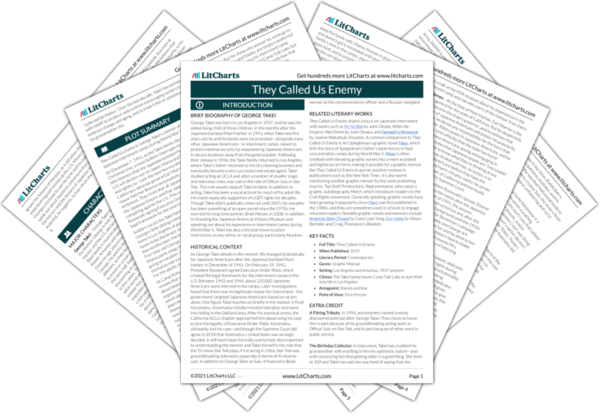Lt. General John L. DeWitt Quotes in They Called Us Enemy
As a teenager, I had many after-dinner discussions with my father... discussing everything from the government’s forced incarcerations of Japanese Americans... to politics.
He taught me the power of American democracy—the people’s democracy.
“People can do great things, George. They can come up with noble, shining ideals.
“But people are also fallible human beings, and we know they made a terrible mistake.”

Unlock explanations and citation info for this and every other They Called Us Enemy quote.
Plus so much more...
Get LitCharts A+From the moment the war began, our loyalty as Americans was constantly under suspicion.
General John L. DeWitt, the commanding general of the western theater of operation:
“A Jap is a Jap... It makes no difference whether he is theoretically an American citizen, he is still a Japanese.”
Senator Tom Stewart (D-TN):
“They cannot be assimilated. There is not a single Japanese in this country who would not stab you in the back.”
Never mind that in the early days of the war, Japanese Americans showed up in great numbers to register for military service.
This was an act of patriotism, but it was met with a slap in the face. They were denied military service and categorized as 4-C: enemy aliens.

Lt. General John L. DeWitt Quotes in They Called Us Enemy
As a teenager, I had many after-dinner discussions with my father... discussing everything from the government’s forced incarcerations of Japanese Americans... to politics.
He taught me the power of American democracy—the people’s democracy.
“People can do great things, George. They can come up with noble, shining ideals.
“But people are also fallible human beings, and we know they made a terrible mistake.”

Unlock explanations and citation info for this and every other They Called Us Enemy quote.
Plus so much more...
Get LitCharts A+From the moment the war began, our loyalty as Americans was constantly under suspicion.
General John L. DeWitt, the commanding general of the western theater of operation:
“A Jap is a Jap... It makes no difference whether he is theoretically an American citizen, he is still a Japanese.”
Senator Tom Stewart (D-TN):
“They cannot be assimilated. There is not a single Japanese in this country who would not stab you in the back.”
Never mind that in the early days of the war, Japanese Americans showed up in great numbers to register for military service.
This was an act of patriotism, but it was met with a slap in the face. They were denied military service and categorized as 4-C: enemy aliens.











